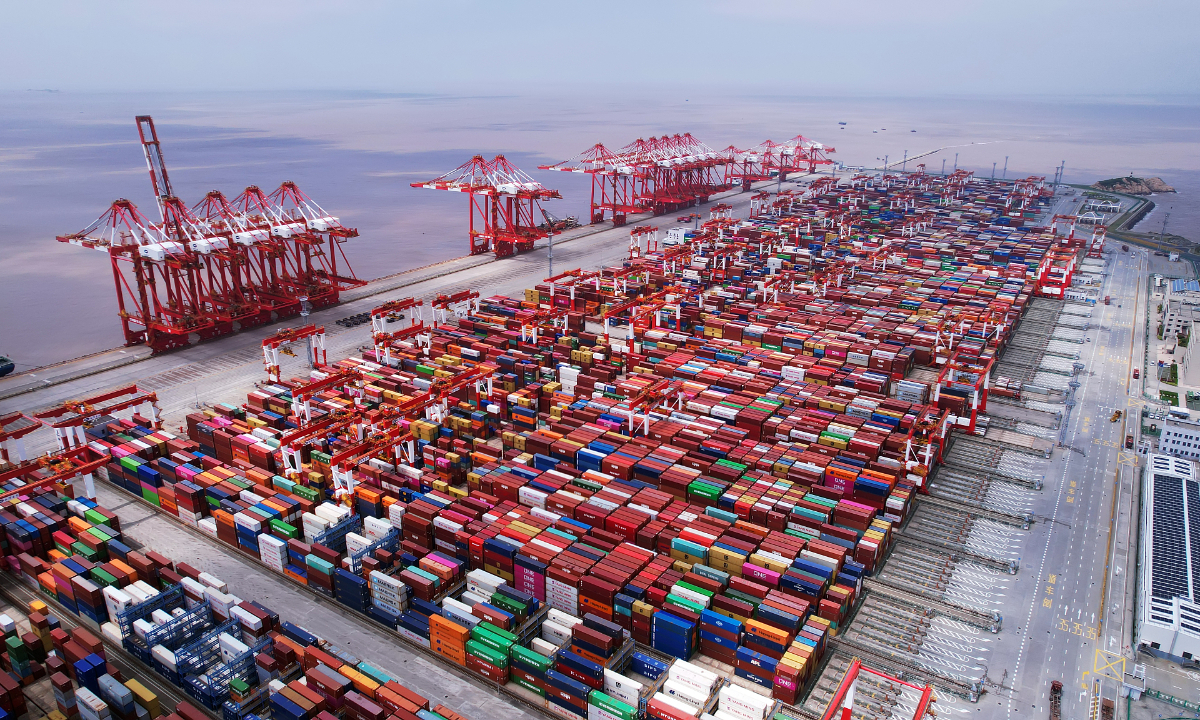COMMENTS / EXPERT ASSESSMENT
Exclusive: With concerted reforms, higher and more resilient economic growth is within reach for China: IMF official

People tour Jiuzhou ancient town in Huangping County, southwest China's Guizhou Province, Jan 26, 2023. Photo:Xinhua
Editor's Note:
The annual Central Economic Work Conference was held in Beijing last week to outline major tasks for next year's economic work in order to shore up a smooth and sustainable growth. Recently, the International Monetary Fund (IMF) raised its forecast for China's GDP growth this year to 5.4 percent from 5 percent in October. The Global Times (GT) reporter Liu Yang conducted an exclusive interview with Steven Alan Barnett (Barnett), senior IMF resident representative in China, who shared views on key policy initiatives adopted at the Central Economic Work Conference. Barnett noted that household consumption and green transformation will be key boosters of China's GDP growth in 2024, which will provide a welcome lift for global economy.
GT: What's your opinion of China's economic policy initiatives for next year that were mentioned in this year's Central Economic Work Conference? Do you think these policy initiatives will continue to drive China's economic recovery?
Barnett: Two policy areas - which are closely related - will be key for the near term.
First, managing the transition to a new equilibrium in the property market. The authorities' goal to engineer the needed adjustment in the property market is welcome. The challenge is to minimize the economic costs of this transition and contain the economic risks. Over the past year, numerous welcome measures have been introduced to support the property sector. Going forward, implementing a comprehensive policy package would smooth the adjustment process. Key aspects of such a package would include further efforts to facilitate the exit of insolvent developers while protecting homebuyers' interests. Such steps would also help to restore confidence in the housing market.
Second, implementing supportive macroeconomic policies. China has policy space to secure the recovery and offset the economic costs of the property adjustment. On the fiscal front, reorienting policy toward supporting household consumption could lift growth without increasing the fiscal deficit. This could include measures to increase programs that support lower-income households and strengthen the social safety net. As for monetary policy, further easing through additional interest rate cuts would provide support for the economy.
GT: Regarding the economic development targets for 2024, what do you think China's growth target for next year will be?
Barnett: As for growth, the key issue is the quality of growth. High-quality growth would mean, to cite some examples, a pattern of growth fueled by gains in productivity and household consumption, as well as continued progress in greening the economy.
As for the number, our latest forecast is for 4.6 percent growth in 2024. We announced this upgraded forecast at the conclusion of our annual consultation visit on November 7.
GT: How do you see China's economic recovery in 2024? Which areas do you think will be most important?
Barnett: Last month we revised up our forecast for 2024 to 4.6 percent. This upgrade also points to what will hopefully be the highlights for 2024.
First, the performance in the first three quarters of this year was stronger than expected. A key factor was strong growth in household consumption. Consumption explained around 80 percent of growth in the first three quarters of the year. Real household consumption, based on the household survey, was also up 8.8 percent year-on-year in the same period. Continuing this pattern - household consumption growing faster than GDP - would be one key aspect.
Second is supportive macroeconomic policies. This will ease the adjustment to a new equilibrium in real estate and help secure the recovery. For example, the 1-trillion-yuan special bond to finance disaster prevention and reconstruction following recent floods was an important factor behind the upgrade of our 2024 forecast.
GT: What is your expectation for the world economy in 2024? How much will China's economy contribute to world economic growth?
Barnett: In our latest global forecasts (published in October), the chief economists of the IMF characterized the global economy as limping along, not sprinting. Why limping? Global growth was forecasted to decline from 3.5 percent last year to 3.0 percent this year, and 2.9 percent next year. In the two decades before the pandemic, global growth averaged 3.8 percent. This is one illustration of how the global economy is limping not sprinting.
Another example is that the global economy is experiencing significant scarring from the sequence of shocks that started with the pandemic, scarring that is generally the greatest in those economies least able to afford it. The level of GDP in low-income developing countries is forecast to be more than 6 percent lower than we had expected before the pandemic. In contrast, scarring in advanced economies is around 1 percent. This underscores how the global recovery is also uneven, as well as slow. It points to the importance of the global community working together to support the recovery in low-income and vulnerable economies.
As for China, last month we upgraded our forecast for 2024 growth to 4.6 percent. At this pace, China should contribute about one-third of global growth in 2024.
GT: What is your assessment of China's economic growth in 2023?
Barnett: We recently upgraded our 2023 forecast to 5.4 percent. This forecast was increased by 0.4 percentage points in November. The upgrade reflected the stronger-than-expected Q3 outturn and recent fiscal stimulus announcements.
At 5.4 percent growth, China by itself would explain around one-third of global growth in 2023. In addition, our research shows that faster growth in China also has positive spillovers on the rest of the world. For example, a 1 percentage point increase in growth in China would, on average, increase the level of output in other economies by 0.3 percent over the medium term. This illustrates how strong growth in China is good for China while also providing a welcome lift to global demand.
GT: In 2023, China has taken a series of policy initiatives to enhance the business environment and stabilize foreign investment and foreign trade. How do you evaluate these efforts? What improvements do you see in China's business environment?
Barnett: China has seen rapid growth in industries like electric vehicles and green technologies. Robust growth in these industries is helping to cushion the economy amid the ongoing real estate market adjustment. We already see this happening to some extent. Relatively strong private manufacturing investment, including in new industries, has partly offset the decline in real estate investment seen in 2023.
China, in fact, stands out as a technological leader in the production of green technologies such as solar panels and electric vehicles. At the same time, these new industries remain small compared to the real estate sector and are unlikely to fully offset the drag from property sector weakness. Supporting medium-term growth prospects will therefore require broad based pro-market structural reforms to ensure efficient allocation of resources and boost productivity growth more generally.
Looking at the world economy, economic integration has helped billions of people become wealthier, healthier, and better educated. Yet, since the global financial crisis, cross border flows of goods and capital have been leveling off. Trade tensions, meanwhile, have been rising globally amid a surge of new trade restrictions. Our research shows that the long-term cost of trade fragmentation could be as high as 7 percent of global GDP.
Rather than fragmentation, the world needs trade to again become an engine of growth. This starts with the world rolling back damaging trade restrictions and distortionary subsidies imposed in recent years. And it continues with positive steps to strengthen the multilateral trading system. China continues to play a critical role in various initiatives at the WTO, and its efforts to restore a well-functioning dispute settlement mechanism are welcome.
GT: Despite multiple downward pressures, China in 2023 continued to promote industrial transformation and upgrading, green development as well as scientific and technological innovation. How do you see the high-quality development of China's economy? In what areas do you see the biggest highlights and potential for China's economy?
Barnett: With concerted reforms, higher and more resilient growth is within reach for China, and this would be beneficial for the global economy.
Our estimates suggest that a comprehensive reform package to boost productivity can raise China's GDP level by as much as 18 percent by 2037 relative to our baseline. This would help China sustain its impressive contribution to global growth well into the medium term. Higher growth in China will also spill over to other countries, especially countries in Asia that have strong trade linkages with China.



